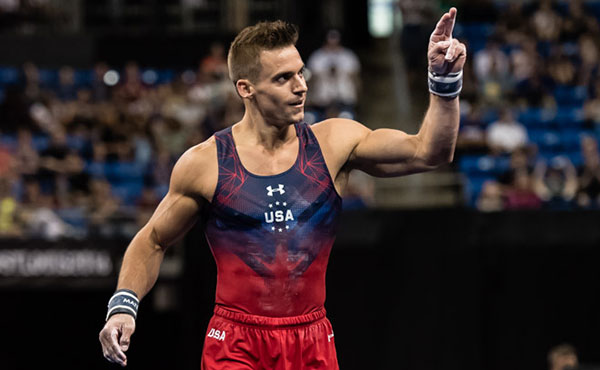
ST. LOUIS – Midway through Thursday night, Sam Mikulak knew something had to change. That’s when he walked on for his floor routine.
Having had a “disastrous” first two rotations on parallel bars and high bar to start the U.S. Men’s Olympic Trials, the four-time and reigning national champion delivered when he needed to the most, hitting a 15.650 on floor – the highest of the event and his highest score of the night – and then never looked back, finishing in first place with a 90.650.
“I think I let this whole Trials thing get to me a little too much,” Mikulak told reporters in the mixed zone. “Instead of doing my gymnastics with trust and belief, I got in my head a little too much. I was definitely mad (after high bar).”
Mikulak will head into Saturday night’s final with over a point cushion, as veteran Chris Brooks was in second with a consistent and inspired 89.175. Danell Leyva rebounded from his Hartford disappointment with a 88.725 in third, while Donothan Bailey, Jake Dalton and Donnell Whittenburg went 4-5-6.
“Everything has come together,” said Brooks, 29, who was a replacement athlete for the 2012 U.S. Olympic team. “This is my last shot at an Olympic team and I’ve had the will to prepare and leave no stone unturned; I just went out there and laid it out all on the floor.”
As did Leyva, who was 16th at the P&G Gymnastics Championships a few weeks ago having suffered an injury prior when one of his dogs bit him. Thursday the 2012 all around bronze medalist was back in firing form, however.
“My job is to be the guy who (the selection committee) says, ‘Yeah, he’s on the team,'” Leyva said. “I felt really strong on everything. I was really happy with the way I went out and performed.”
The five-member Olympic team and three replacement athletes will be named following Saturday night’s final. While the selection committee will look at a host of factors, the four-day all around scores from P&G Championships in Hartford and Trials here in St. Louis will be closely scrutinized.
Mikulak appears to be the only gymnast within striking distance of securing an automatic lock, which requires a gymnast to finish in the top two from the two qualifying events as well as be in the top three in three events. Mikulak is first in the all-around while being first on pommel horse, third on parallel bars and fourth on vault, just 0.125 behind Whittenburg there.
With his better-late-than-never start Thursday, Mikulak widened his three-day lead (two days from Hartford, one here), with 272.150. Brooks is in second at 269.025, Dalton third with 267.325 and then Akash Modi, Whittenburg and Yul Moldauer fourth through sixth.
The Trials point standings can be misleading, however. None of John Orozco, C.J. Maestas, Alex Naddour, Steve Legendre, Sean Melton and Eddie Penev did a full six events on Thursday night, scratching out of one or two.
Mikulak has always seemed to need a little fuel for his fire. After falling flat on his p-bars dismount in his opening rotation, he stalled at the top of the high bar, his body going one way when he was supposed to go the other. Tim Daggett called it a “disastrous” start for Mikulak, who – along with Dalton, Leyva and Orozco – is trying to make a second consecutive Olympic team.
But then came the floor and Mikulak settled in. His parents, including father Steve, an all-American gymnast at Cal, sat just over the floor in the front row at Chaifetz Arena and sprung to their feet upon Mikulak’s floor finish. Sam pumped his fists, pointing his finger at his family. He was back.
“They know how to calm me down and cheer me up,” Mikulak said of his parents. “I looked up to my whole cheering section and my dad was saying, ‘Hey, you’re in this man. Get pumped, we’re with you.'”
Leyva’s stepfather, Yin Alvarez, is ever-present on the competition floor, and he was in full force on Thursday night, bounding and bouncing after each of Leyva’s six routines. The Miami native said it was reminders from Yin that gave him the belief again.
“I trust Yin more than I trust myself in a lot of instances and he reminded me to trust myself,” Leyva said. “That’s what I was doing and it was working.”
“He’s seemed like a completely different person this week,” said Nastia Liukin of Leyva on the NBC broadcast.
“He did all he could today,” Daggett added.
It was a night where Moldauer, Modi, Brandon Wynn and Paul Ruggeri didn’t help clarify better where they stand on the Olympic scale, going seventh through 10th. Wynn was third on rings and Ruggeri third on vault, though Moldauer and Modi peaked at fifth (on p-bars and high bar, respectively).
Whittenburg was strong across the board, winning on p-bars and going top five on floor, rings and vault.
Three of the six gymnasts who didn’t compete in all six events were winners in another, Naddour hitting a 15.650 on pommel horse for first, Maestas’ 15.550 the best on rings and Orozco an evening-best 15.475 on high bar.
Orozco was a dissatisfactory 10th in Hartford, but finished inside the top eight in all four of the events that he competed in on Thursday night.
“It’s harder to make that second Olympic team,” Liukin said of Orozco on NBC.
While Mikulak only gained steam as the night wore on, it was Brooks who started strong and stayed strong, delivering one satisfactory performance after another.
“One more to go!” he yelled after finishing his fifth rotation, on floor. He said later he felt total “relief” when he finished on pommel horse, his final rotation.
Brooks said his past “almosts” – a career of playing second fiddle – have continued to motivate him in everyday training leading up to St. Louis.
“I carry that in the gym” at practice, he said. “That’s where you can make the difference. I carry that chip on my shoulder everyday, but when I walk out to compete, that all goes away. You have to take it one event at a time; I try not to worry about any of it.”




